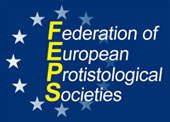First ECOP-ISOP Joint Meeting 2015 Seville-Spain
Current Trends in Protistology Research at the VII ECOP – ISOP Joint Meeting
The VII European Congress of Protistology (VII ECOP) convened in Seville (Spain), on 5–10 September 2015, hosted by the Specialized Group of Protistology (Grupo Especializado de Protistología, GEP) of the Spanish Society of Microbiology. ECOP congresses are the most visible activities of the Federation of European Protistological Societies (FEPS). ECOP congresses take place every four years (the two previous ones were held at Berlin 2011, Germany, and St. Petersburg 2007, Russia) and cover all aspects of Protistology. VII ECOP was organized for the first time as a joint meeting in partnership with the International Society of Protistologists (ISOP). Therefore, this first ECOP–ISOP joint conference was expected to be an outstanding meeting point for protistologists worldwide to present their work and discuss their scientific achievements. The meeting was held at two venues located near the centre of the city and at a walking distance from each other, the Hotel-Conference Center Sylken Al-Andalus Palace and the Reina Mercedes Scientific Campus of the University of Seville.
The congress was designed to provide a comprehensive overview of the latest research developments in different protistological fields, from the molecular to the ecological ones. Contributions were presented in the form of 8 plenary lectures given by renowned protistologists, 11 invited symposia, 10 invited workshops, 9 general oral sessions,3 special sessions for PhD students and young postdocs, and 3 poster sessions. ISOP organized and generously supported two symposia and two plenary lectures, one of them being the 2015 Hutner Award lecture which was given by Ross Waller (University of Cambridge, UK). In this way, the ISOP 2015 annual meeting took place in close connection with VII ECOP, hence the name VII ECOP–ISOP Joint Meeting. With about 370 registered participants, the conference brought together protistologists from 38 countries in Europe, North and South America, Asia (Near, Middle and Far East), Africa and Australia. The substantial number of attendees from Asian countries like China RP, Taiwan, Korea and Japan was a noteworthy aspect of the conference. This broad geographic participation contributed to give a strong international character to the event. Besides, notices on hotel accommodation, session venues, and last-minute changes in scientific and social programmes were posted on the congress website www.viiecop.com.
The Final Programme and Abstracts Book (430 pp.) includes 363 presented papers, of which 8 are plenary lectures, 164 oral presentations and 191 poster presentations. Authors were asked to assign their presentations to one of the nine topics covered by the congress: Genomics/Molecular Biology, Evolution/Phylogeny, Cell Biology, Taxonomy, Ecology, Physiology and Metabolism, Barcoding, Environmental Microbiology and Parasitology. Interestingly, the assignment of presentations to the different congress topics shows phylogeny/evolution and taxonomy as emerging trending topics, although studies on cellular/molecular biology and ecology/environmental microbiology are alsowell represented. This could be related to the increasing data pointing to the protist world as a vast reservoir of hidden biodiversity, enough even to identify novel evolutionary lineages of eukaryotes. The significant number of presentations about parasitic protists should also be noted, denoting the continued interest on this topic by the research community.
Two interesting satellite events were organized concurrently with the VII ECOP–ISOP Joint Meeting: a two-days practical course for technicians of wastewater treatment plants on “Protists Relevance in Wastewater Treatment”(organized by GBS-Sevilla and EMASESA), and the first meeting of the Uni-Euk consortium, an outstanding international initiative aiming to implement global coordination on taxonomy and evolutionary studies of protists.
Besides, a social programme for registered participants and accompanying persons was organized which included the Welcome Reception (September 5) and a formal congress lunch (September 6) at the Al-Andalus Palace Hotel (September 6), a guided visit (Wednesday, 9) to the Reales Alcázares, the most impressive monument of Seville and the oldest Royal Palace still in use in Europe, and the congress dinner (Wednesday, 9) at the Restaurante La Raza, located in the Maria Luisa Park. On the other hand, conference attendees had time to enjoy the monumental places and the rich Andalusian gastronomy of the charming Seville, a historical city that for almost three centuries was the gateway to the Americas and a unique space for cultural and commercial exchange between Europe and the New World.
It is expected that ECOP congresses will continue being regularly celebrated to bring together outstanding researchers in the field of Protistology from different countries. Also, the organization of joint meetings in partnership with related scientific organizations should be encouraged, taking into account the very positive experience with the joint meeting of Seville. In this regard, the Italian Society of Protistology has recently notified to FEPS its firm commitment to hold the next VIII ECOP in 2019 in Rome (Italy) under the coordination of Dr. Maria Cristina Angelici, so the continuity of ECOP congresses is assured.
Aurelio Serrano
President of the Organizing Committee of the VIIECOP–ISOP Joint Meeting 2015
Instituto de Bioquímica Vegetal y Fotosíntesis,
Universidad de Sevilla y CSIC, Sevilla, Spain
E-mail address: aurelio@ibvf.csic.es
